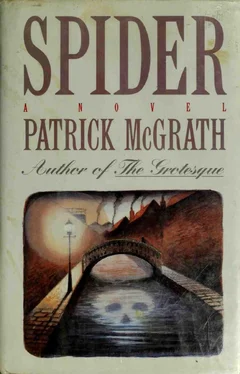It subsides to a flicker and a crackle and I stand up from the table, I must leave the room if only for five minutes. I shuffle to the door and there’s an ominous howl from above as I lay hands on the knob and turn it, but their wrath I can endure for a short time at least. Down the darkened landing to the lavatory, where I stand over the toilet and with trembling fingers unbutton my trousers. A small pipelike apparatus, something from a plumber’s toolbox, protrudes and begins urinating tiny black spiders into the bowl, where they curl up into points and float on the water. I appear to be infested; I appear to be playing host to a colony of spiders; I appear to be an egg-bag.
Back in my room I stand at the table leaning on my hands and gaze out at the leafless trees in the park below. Illuminated dimly by the glow of the streetlamp, their fingery boughs form a pale tracery against the darkness. The night sky is cloudy, there is no moon. Nothing is moving out there. I sink with a rustle of newsprint and cardboard into my chair and pick up my pencil. I’d thought I wouldn’t go through another night of it; in this as in all else I am wrong, I delude myself with the idea that I am free, have control, can act. It is not so. I am their creature.
This is the work for me, I’d thought as I watched the men in the vegetable gardens. After numerous requests I was given my chance, and I did not disappoint them. By this time I had spent almost ten years in Ganderhill and was a well-known figure. I had a room on Block F and a few legitimate possessions (a few illicit possessions too, squirreled away in one hole or another). I was comfortable, I had my niche; I was known as something of a solitary, though I did maintain a sort of friendship with Derek Shadwell, a man from Nigeria who, like me, had been wrongly accused of murdering his mother; Derek and I played billiards together in the dayroom every evening. I was on good terms with the attendants, and was regularly greeted on the terraces by Dr. Austin Marshall. It was in a way the apex of my career in Ganderhill, to claim a place on the working party in the vegetable gardens; and I was confident that by application of what my father had taught me as a boy I’d be able to do all that was asked of me there.
At the eastern end of one of the terraces a set of stone steps descended to a patch of lonely ground about the size of a football field, enclosed on one side by a section of the periphery wall, in the shadow of which stood an old elm tree. Perpendicular to the wall on the southern side another set of steps descended a slope that gave onto the cricket field, while to the north there was a steep climb through an uncultivated patch of bushes and trees to the higher terraces. It had a derelict, forsaken look to it, this lonely field, and had once been a tea garden, for a few pieces of old-fashioned garden furniture—a pair of wicker chairs, a wrought-iron table— stood rotting and rusting under the elm. Elsewhere flourished clumps of weeds and patches of wild grass, and this being October dead leaves lay heaped against the wall in damply moldering drifts in which colonies of spotted toadstools had sprung up. Close to the wall at the foot of the wooded slope there was an unsightly heap of waste lumber and dead branches. My first morning in the vegetable gardens I was put to work clearing this ground for planting in the spring.
I had a wheelbarrow and a garden fork; there were spades and mattocks in the shed, when I needed them.
I went to work. I was younger then, I was strong, I could lift heavy boulders into the barrow, wheel them to the steps and carry them up to the pile behind the shed. It was a windy spot, and though the work warmed me I kept my donkey jacket on, with the collar turned up. I’d also been issued yellow corduroy trousers, black boots, and a green jersey. It took me a day to clear the boulders and make a start on the dead leaves; the work tired me, but it exhilarated me too, and when I stopped briefly to smoke a roll-up I leaned on the fork and gazed out over the landscape, and felt at peace. Previously I’d had a job in the Ganderhill workshop, standing beside Derek Shadwell hammering pallets all day, with nothing but a small barred window with a view of a wall, and no light but what came from a dusty, crackling fluorescent tube.
I made progress with the leaves, wheeling my barrowloads up the slope and along the terrace to the compost heap, this one much bigger than my father’s, for it claimed the organic refuse of the entire institution. In the course of these journeys with my wheelbarrow I passed the other men in the working party, who would say, “All right, Dennis?” or, “Take it easy, Dennis,” and I would say, “All right, Jimmy,” or whatever. With the leaves and the boulders cleared I set to work cutting the weeds down, and when this was done I grubbed out the roots with a mattock. It was on the third or fourth afternoon, having dumped a load of weeds and roots on the compost, and while wheeling my empty barrow back along the path toward the shed, that I saw a small figure in a black coat and headscarf at the top of the steps, her back toward me; no sooner had I seen her than she slipped down the steps.
I stopped dead in my tracks and dropped the handles of the wheelbarrow. I had not been expecting to see her, not after so long, not after being disappointed so often. I ran past the shed to the top of the steps and gazed down at the tea garden. It was deep in shadow, for it was after five by this time and the sun was low in the sky. I stood at the top of the steps—to either side of me a squat brick post with a stone ball on top—and raked the area with my eyes. There!—by the tangled pile of branches and lumber in the far corner— surely I saw for an instant a figure slipping through the gloom! I came quickly down the steps, and then I was running across the field; reaching the wall I peered up the wooded slope that climbed to the higher terraces. Did I see her? I clambered up the slope, twigs and dead branches snapping beneath my boots. Halfway up I stopped and gazed wildly about me: a profound silence hung there in the trees, and it was too dark now to distinguish anything clearly. For several minutes I stood there, making no sound or movement; then I crunched back down to the field, which looked more desolate than ever as darkness rapidly came on. My immediate excitement subsided somewhat, and was replaced by a vague thrilling of anticipation, a sense that something momentous had just been set in motion. I went back across the field and back up the steps, gathering my tools on the way, and put them back in the shed before returning to Block F with the rest of the men.
Ah, she tormented me, like they torment me. Listen to them now! Surely I must be damned and twisting in hell to endure this, surely I must be dead already, dead and gone, and this wrapped corpse of mine animated merely by some odd freak gust of ghoul’s breath, to endure this! And yes, she tormented me: in the months and years that followed, on countless occasions I caught glimpses as fleeting, as tantalizing, as the one I’ve described—that small slim figure in coat and headscarf, clutching her handbag and standing, say, in the dappled shade of the elm tree by the wall, on a summer afternoon, her head turned away, and me on my knees in a bed of cabbages or lettuce or spring onions, and I would drop my trowel, rise to my feet, and a moment later be leaping the rows of vegetables (thinking always, in my madness, this time, this time)—and finding only a mocking play of light and shadow as sunshine sifted through the canopy of leaves overhead. There was one summer, I remember, when her presence was especially vivid, when I would see her almost daily, and I even heard her say my name as I worked alone in the gardens, heard her whisper: “Spider! Spider!”—and I whirled around to nothing, nobody, silence. But late that summer—it must have been September, we’d had one of the best summers in living memory, and Ganderhill was so rich in fresh vegetables we were selling them to neighboring villages—late that summer there was a string of afternoons when I’d gaze south from the terrace and the sky was transformed: a bluish golden light of extraordinary intensity, a great broad strip of radiance centered on a point due south of my own precise position, was spread across the sky, filling somewhere between a sixth and a quarter of it from the horizon up as high as the eye could see—and I understood something, then, in my wonder at the sheer splendor and magnificence of the spectacle, of the nature of my mother’s presence in Ganderhill. Sad thing, though, that later in the year, in the late autumn and winter, when she stayed among the shadows and only came at dusk, I lost the insight, and felt again frustration and at times angry impatience that she could go on teasing and tormenting me like this. Yet I would rather have had her phantom presence than nothing.
Читать дальше












